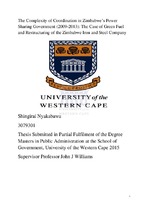| dc.contributor.advisor | Williams, John J. | |
| dc.contributor.author | Nyakabawu, Shingirai | |
| dc.date.accessioned | 2016-01-20T10:12:44Z | |
| dc.date.available | 2016-01-20T10:12:44Z | |
| dc.date.issued | 2015 | |
| dc.identifier.uri | http://hdl.handle.net/11394/4724 | |
| dc.description | Masters in Public Administration - MPA | en_US |
| dc.description.abstract | This study examines the challenges of coordination in Zimbabwe’s power sharing government (2009 to 2013) between ZANU PF and the two MDC formations in the implementation of policies that cross ministerial jurisdictions under ministers from different political parties. The analysis was done through the theoretical lens of Shepsle and Laver (1996) that a cabinet minister as the political head of a major government department have the formal discretion of any policy issues under his jurisdiction and uses his or her own power to influence the substance of any specific proposals that matters within his or her own jurisdiction. I empirically examined the restructuring of the Zimbabwe Iron and Steel Company and the Green Fuel Project where the outcome of the projects required joint working between ministries controlled by different political parties. Green Fuel is a large scale ethanol producing factory constructed at a cost of US$600 million as a partnership between the Ministry of Agriculture and a private investor, but for the blended fuel to be consumed as an end product needed collaboration from the Ministry of Power and Energy Development to put out legislation enforcing mandatory blending. The Minister of Energy and Power Development ruled out mandatory blending of petrol and ethanol that left the US$600 million Green Fuels ethanol projector ground its operations and imperilled 5000 direct jobs the company had created arguing that the government does not make public policy for individuals and that the project was started without the consultation of the MDC. He also argued that the bio ethanol project affected communities in various ways including dispossession of their land, the slashing of their crops, killing of their cattle and the dispossession from their land. The restructuring of ZISCO entailed the partial sale of the government owned entity spearheaded by the Ministry of Industry and Commerce. It went through a bidding process and 54% of shares were transferred from the state to EAHL and it was renamed New Zim Steel at a ceremony presided over by the head of state. Critical to ZISCO resuming operations was the transfer of mineral rights and the Minister of Mines Obert Mpofu refused to do so arguing that he did not know about the ZISCO deal, was excluded from the negotiation process of the agreement deal despite that the agreement was concluded by cabinet. In both instances, policies that emanated from a ministry controlled by a minister of another political party did not achieve their horizontal objectives. | en_US |
| dc.language.iso | en | en_US |
| dc.publisher | University of the Western Cape | en_US |
| dc.subject | Green fuel | en_US |
| dc.subject | ZISCO | en_US |
| dc.subject | ZANU PF | en_US |
| dc.subject | MDC | en_US |
| dc.subject | Power sharing | en_US |
| dc.subject | Ministerial discretion | en_US |
| dc.title | The complexity of coordination in Zimbabwe’s power sharing government (2009-2013) : the case of green fuel and restructuring of the Zimbabwe Iron and Steel Company | en_US |
| dc.rights.holder | University of the Western Cape | en_US |

